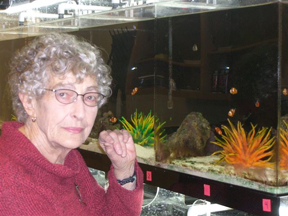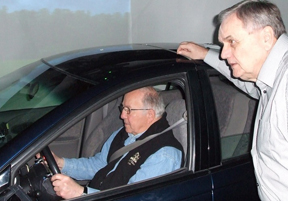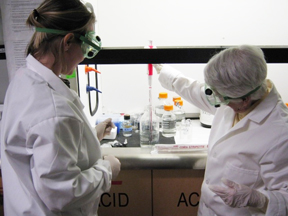OLLI Offers Mature Adults Learning and Research Opportunities
February 12, 2012
I have been able to…put my toe in the ocean of knowledge that is going to surround us in decades to come, and I feel very, very blessed to be able to do so.” — Tauby Shimkin, OLLI Scientist
Unlike some senior adults who, after retiring from full-time jobs also retire from learning, a group of local retirees are continuing to learn—not only in the classroom—but in some more unusual places: Illinois' research labs. These seniors are participants in the OLLI Scientist Program, sponsored by Illinois' Osher Lifelong Learning Institute, more commonly referred to simply as OLLI. This program for adults age 50 or older offers learning opportunities ranging from classes offered on campus to lab work, a lecture series, and overseas travel.

OLLI scientist Tauby Shimkin poses by aquarium in Illinois lab.
Created by the Bernard Osher Foundation, an organization dedicated to improving quality of life through the arts and higher education, the national OLLI program began as an expansion of the University of Southern Maine’s Senior College in 2001. Today there are 117 OLLI programs at universities and colleges in all 50 states. Illinois' OLLI program began in fall 2007 with an impressive 297 starting members and Kathleen Holden as the founding director. This spring marks a new season for OLLI, with a round of new projects and a new director, Christine Catanzarite, taking the lead.
OLLI's spring 2012 course offerings include 29 options covering topics like:
- America's Ancient Chiefdoms, 1539-1543
- Children's Literature Worth Reading after Age 50
- Friedrich Nietzsche: Threat or Menace?
- How Genomics is Changing Everything
- The Human Place in Nature: Sustainability Series
- Tai Chi
- Three-Minute Jazz Masterpieces

OLLI scientist James Caspary helps on Illinois
research project on reaction times of seniors.
Many of these courses are taught by current or former Illinois faculty, including Dr. Gene Robinson, director of the Institute for Genomic Biology. “I volunteered to teach a class and started doing so, and I was just struck by the amazing interest and engagement of the OLLI members…The OLLI members were so engaged, they brought so many different experiences that they had in life to the table. They used that information; they use those perspectives; they challenge you; they ask questions; they are bringing all of this to [the classroom]; and it was just an experience of sort of a classroom as a community.” In addition to courses, more than a dozen study groups are led by the OLLI members themselves, which are book discussion groups or cover other topics like “The Physics You Need to Be President,” “Society and the Fall of Innocence,” and “Aging Concerns: Let’s Talk About What No One Talks About.”
Members looking for a more in-depth project can join the OLLI Scientist Program, in which individual OLLI volunteers are paired with faculty researchers and then trained on lab tasks that support the labs' ongoing research. OLLI Fellow and Illinois graduate student Geena Skariah acts as a mentor to the OLLI scientists and works to place them in laboratories across the campus.
The success of the OLLI Scientist Program has been a surprise to some, including Skariah: “When you are trained to be a scientist, you come into the skepticism that I have a lot of. When I started off looking for areas that I can get a fellowship from, I looked at the OLLI Scientist Program and honestly, I thought, ‘I don’t think this can be done.’…So I decided to do what a scientist would do, and I decided to go in and test it, so I joined the program, and I have to say, I am a believer now. It can be done; it’s being done; and it’s so remarkable to see.”

OLLI scientist Jo Pride works in Illinois lab.
According to Robinson, the Scientist Program benefits both the participants and the University. First of all, an OLLI scientist is a great resource for a research lab by helping carry out the many tasks involved in a given project and by providing a different perspective and keeping other lab staff on their toes. They force faculty to pull back from the technical aspects of their work and explain the reasons why they do what they do and the goals they hope to achieve through their research. Skariah has experienced this first-hand. “If I had to tell you what I am doing right now, I am sure most of you won’t be able to understand it. If you ask an OLLI member to do it, they will break it down for you and tell you what you are supposed to see. and that has been a very rewarding experience for me. I have learned to explain my research and relay it, and that is something that I got out of the OLLI program. That is something that I am going to carry throughout my whole graduate career.” Illinois faculty member Andrew Leakey has personally observed the benefit of having OLLI scientist Jo Pride in the lab. “Jo has been like a breath of fresh air for all of us. It has been extremely fun to have her in the lab. It’s quite easy for us to get focused on the immediate goals…you sometimes forget the broad perspective, and Jo coming in and asking more perceptive questions...really reminds us of the reason we got into this thing in the first place,” he said.
Through their experiences working with faculty, staff, and students, OLLI scientists get a unique look at how things work in Illinois labs and become ambassadors to the community for the University and for science. They themselves gain new knowledge that can guide their decisions and opinions. “We are creating individuals that understand science, and they can hopefully make their own decisions in their lives and discuss scientific issues or the issues of the day and how they relate to science in an informed way. And then as we all know, we need a lot more information about science; we need a lot more acceptance of the scientific approach to help guide society in facing many problems that we have,” Robinson said.
Finally, the OLLI Scientist Program benefits the participants themselves. Several OLLI scientists recently had an opportunity to speak about their experiences in the program and share about how it has affected them. Patricia Porter views the program as a medium for community service. “One thing that I appreciated about the program is, I have been allowed to pursue my passion, and my passion is giving back to society. Arnold Beckman said, ‘Always strive for excellence,’ and this program has given me a stage on which I can do just that. People from my generation…were raised to give back, and so this has been a wonderful outlet for that passion of mine.”
For Tauby Shimkin, the program offers opportunities she could only imagine when she was growing up. “I grew up in the depression era, and we had parents who thought we ought to go out and get jobs…like teaching, nursing, etc …One never thought of a career in science, but I had an image in my head…This was really an opportunity for me to do something way different from whatever I had ever hoped I could do, and no I haven’t learned how to solve all of the problems, and no I probably won’t be the best math maker that Justin ever had, but I, Tauby Shimkin, have been able to…put my toe in the ocean of knowledge that is going to surround us in decades to come, and I feel very, very blessed to be able to do so.”
Beckman Institute director Art Kramer sums up the attitude of those who are involved in the OLLI Scientist Program with one question: “If you want to become a scientist when you are 65, why not?”
Author: Christy Glaze, Office Support Specialist, I-STEM Education Initiative
More: Senior Citizens, Summer Research, 2012













.jpg)
















